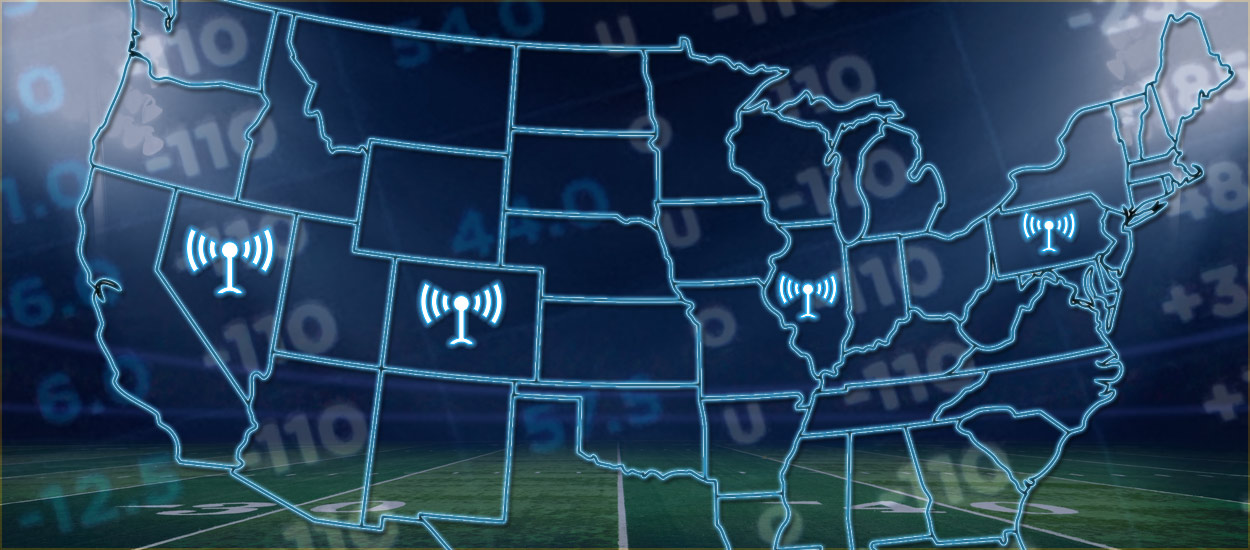Regulated sports betting in the U.S. flourishes even during COVID
There are currently 18 states that offer licensed and regulated sports betting and most expressed satisfaction with the results of the betting so far, as long as the ability to bet online exists.
New Jersey and Delaware were the first states to offer sports betting and while New Jersey has done extremely well, thanks to the option of wagering on sports online there, the revenue for Delaware sports betting has been quite poor. Unlike New Jersey one must be physically present at a racetrack to bet on sports in the First State. And it has only been recently those venues were even reopened.
According to reports from the New Jersey Division of Gaming Enforcement, New Jersey's online sports betting revenue from March to September was just over $145 million, including a massive $668 million handle in August and $748 million in September alone compared to around $123 million in revenue the prior year, representing an 18% increase in revenue. Of course, this included the months of March, April and May when most sports leagues were shut down due to the coronavirus, although the NHL and NBA playoffs did restart during the last two months of this year. And in July and August alone revenue in New Jersey was over $61 million for online sports betting compared to just over $33 million for July and August last year. Most of the betting took place via the FanDuel and DraftKings apps, which are affiliated with Meadowlands Racetrack and Resorts Casino. When Atlantic City and the racetracks were closed, 100% of sports betting took place online, but even since the casino reopening, almost 85% of sports betting still is taking place online. I spoke with a New Jersey analyst who claimed that this is not surprising since New Jersey residents are still not comfortable going out due to the virus, as is evident with the poor casino revenues in Atlantic City, but online sports betting provides them an opportunity to bet on games and have a vested interest while not risking getting sick. The analyst also noted that the revenue in March was next to nothing thanks to March Madness being cancelled and it would have been much higher had those games been played. New Jersey does not allow betting on any college games involving New Jersey teams or games that take place in New Jersey, but players can still bet on college games taking place elsewhere.
Most of the betting took place via the FanDuel and DraftKings apps, which are affiliated with Meadowlands Racetrack and Resorts Casino. When Atlantic City and the racetracks were closed, 100% of sports betting took place online, but even since the casino reopening, almost 85% of sports betting still is taking place online. I spoke with a New Jersey analyst who claimed that this is not surprising since New Jersey residents are still not comfortable going out due to the virus, as is evident with the poor casino revenues in Atlantic City, but online sports betting provides them an opportunity to bet on games and have a vested interest while not risking getting sick. The analyst also noted that the revenue in March was next to nothing thanks to March Madness being cancelled and it would have been much higher had those games been played. New Jersey does not allow betting on any college games involving New Jersey teams or games that take place in New Jersey, but players can still bet on college games taking place elsewhere.
Delaware, on the other hand, which does not allow online sports betting, has seen practically non-existent revenues. The state had about $570,000 in revenue in March, all bet prior to the pandemic and had no revenue in April, May or June as the racetracks were closed and as such no one could bet on sports. But even after reopening, they only had $120,000 in July, $370,000 in August and just under $2 million in September, which is a slight increase over 2019. One can argue that the reason for legalizing sports betting was different in New Jersey and Delaware, but the truth is that each state wanted to boost the offerings at racetracks and casinos in order to help provide new revenue sources for those venues. The difference is that Delaware actually believes that being forced to bet on sports at the racetrack will provide new interest in the sport of kings, while New Jersey just wants to give the venues new revenue options in case the interest in land-based casino and physical racetrack betting doesn’t improve.
Looking at other states that have licensed and regulated sports betting, the success again is based on whether they allow online sports betting or not. Here is an analysis of the sports betting in the other states in order of when they started operating.
Online is King
Pennsylvania has seen almost $67 million in revenue between March and August including over $27.5 million in revenue for August alone and a whopping $365 million handle. These figures were more than double the 2019 revenue and handle, with almost 90% of the bets having been made online mostly at DraftKings and FanDuel, although Unibet, PointsBet, Fox Bet and BetAmerica have been gaining ground. One of the big complaints by many Pennsylvania residents is that the sportsbooks, casinos and horse racing are all separate, logins even for the same company, so one needs to log out of one app to bet on the other. A particular Philadelphia bettor told me, "I signed up with BetAmerica but it’s frustrating. I can’t bet horses when inside the sports app and the same holds true for casinos. It’s log in, log out and for sports betting I can’t parlay within the same game." Iowa, which allows online sports betting has seen over $10.5 million in revenue with a handle of over $160 million from June to September, far exceeding expectations and a very healthy hold over 7%. Almost all the sports betting takes place at either DraftKings sportsbook or PointsBet and the vast majority of the betting this year is said to have been done online, despite the casinos never having really closed other than for a few weeks at the beginning of the pandemic. Still, in order to wager on the DraftKings app, a physical account has to be set up at Wild Rose Casino and in order to bet on the PointsBet app, a physical account has to be set up at Catfish Bend Casino.
Iowa, which allows online sports betting has seen over $10.5 million in revenue with a handle of over $160 million from June to September, far exceeding expectations and a very healthy hold over 7%. Almost all the sports betting takes place at either DraftKings sportsbook or PointsBet and the vast majority of the betting this year is said to have been done online, despite the casinos never having really closed other than for a few weeks at the beginning of the pandemic. Still, in order to wager on the DraftKings app, a physical account has to be set up at Wild Rose Casino and in order to bet on the PointsBet app, a physical account has to be set up at Catfish Bend Casino.
Indiana has allowed sports betting since last September and online sports betting since October and they were shocked to see over $1 billion in handle since its inception. September 2020 was particularly impressive as the state had $44 million in revenue from a handle of over $207 million, representing 33% of the total bets since March, when the pandemic was declared. The ability to bet on professional and college football and basketball has accounted for the huge handle. It is notable that despite sports betting always having been available at the casinos, over 80% of bets so far have been online and reports are that it was closer to 90% since April of this year. Indiana has several online sports betting apps but again most of the betting has taken place on DraftKings, FanDuel and the BetRivers apps.
New Hampshire has seen almost $4.8 million in revenue since March on a handle of about $67 million. These figures are a little lower than expectations, although New Hampshire residents have argued that the offerings at DraftKings, controlled by the New Hampshire lottery, are so limited that they just aren’t that interested in betting at the present moment. Intralot will soon take over the sports betting in that state and it is expected that New Hampshire will consider more offerings that will be enticing to sports bettors.
Colorado has had online sports betting almost since its inception and pretty much all bets take place online. Since May of this year when sports betting began, the state has seen over $19 million in revenue with a handle of $252 million and a hold over 7%. Of that handle, just over half occurred in the month of August with a particularly large interest in NHL games. It’s hard to tell how things will continue to proceed, but estimates are that September will be even better and that state officials are over the moon with the interest in sports betting, especially since it started during the pandemic. Like with other states it appears the DraftKings and FanDuel are the biggest revenue generators.
Illinois and Washington D.C. sports betting only began in June of this year, but the results have been welcomed. In Illinois alone over $200 million has been wagered on sports in the three months with revenue of over $11 million and a hold approaching 6%. DraftKings, FanDuel and PointsBet make up the vast majority of online sports wagering in the state and unlike other states, a resident doesn’t have to set up an account at a physical casino or racetrack in order to play on the app. Expectations are that Illinois will become one of the largest revenue states for sports betting going forward.
Oregon and West Virginia were left off the list since they do have an online option, but the sports betting is conducted through their lotteries and indications are that the betting is really more of a type of lottery than true sports betting. Offers are limited and unappealing for real sports bettors.
No Internet wagering equals lower revenue
As for the states that do not have an online offering and sports betting can only be done at a physical location the results have been quite poor this year.
Mississippi hit $3.7 million in August 2020, which has legislators giddy, as it represented an increase of almost 30% over August of 2019. However, the numbers aren’t a fair comparison since there were far more sports in August 2020 due to the postponement of the NBA and NHL playoffs. July had $1.3 million in revenue, comparable to July of 2019, while May to June saw next to nothing, including a loss in June. The requirement that one needs to wager at a physical land-based, or riverboat casino guaranteed those figures. Most of the physical locations were closed, so residents had to turn offshore to bet on their favorite sports during the pandemic. There is currently one legislator trying to get online sports betting legalized, citing that the state is missing a big opportunity.
Rhode Island finally saw over a million dollars in revenue in August thanks to the casinos finally operating at a decent capacity, but there was really nothing bet during the rest of COVID, as most people weren’t prepared to visit a William Hill physical sportsbook during the pandemic.
New York legalized sports betting and it was supposed to help many casinos, especially the Seneca casinos in western New York, but no bets have taken place since the start of COVID as the casinos were closed and bets must take place in person.
Michigan saw almost $2 million in sports bets in August with over $15 million in handle and that was with casinos reopening to only 15% capacity. Analysts estimate that had Michigan allowed online sports betting during the entire pandemic the state would be near the top of revenue states, but having to bet in person at a physical casino has been limited interest.
Both Arkansas and New Mexico allow sports betting at physical casinos, but apparently the figures have been very poor and neither state has separated out the sports betting from other casino revenue. It should also be noted that Montana legally has the right to offer sports betting, which was granted to the state as an exemption to PASPA in 1992, but thus far they have not launched any sportsbook betting.
So, based on the figures it is clear that states which adapted online sports betting are thriving as bettors wager on their favorite sports from the comfort of their homes, while states that still require in-person land based sports wagers are not doing nearly as well. This is an indication that people want to wager on sports, but want to do so easily and safely. What is also clear is that DraftKings and FanDuel are by far and away the two brands that are leading the way, even if the brands have to be affiliated with a land-based casino or racetrack in most states. It also explains why so many investment analysts are bullish on DraftKings stock (DKNG), which is currently considered a bargain at just over $70 a share, but that's a topic for another day.
Read insights from Hartley Henderson every week here at OSGA and check out Hartley's RUMOR MILL!







































